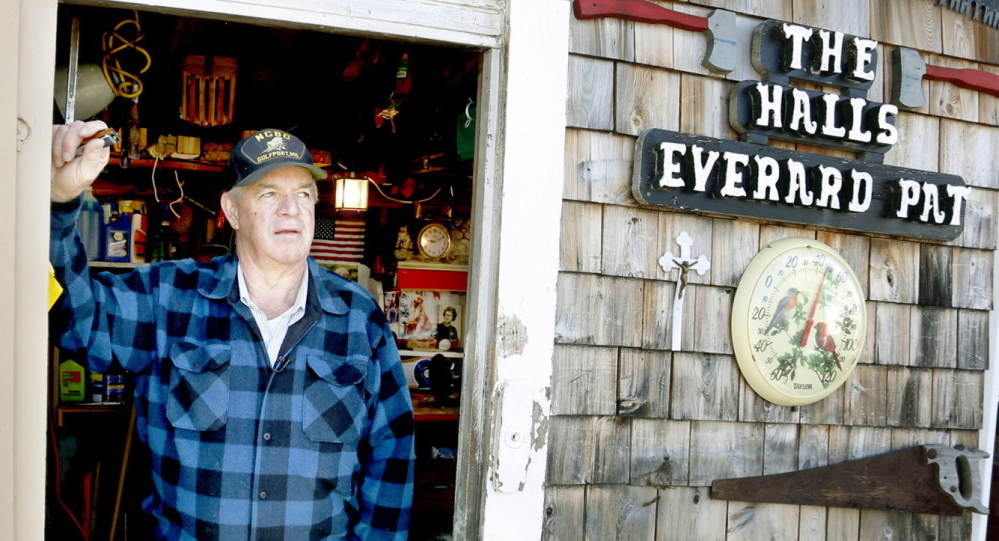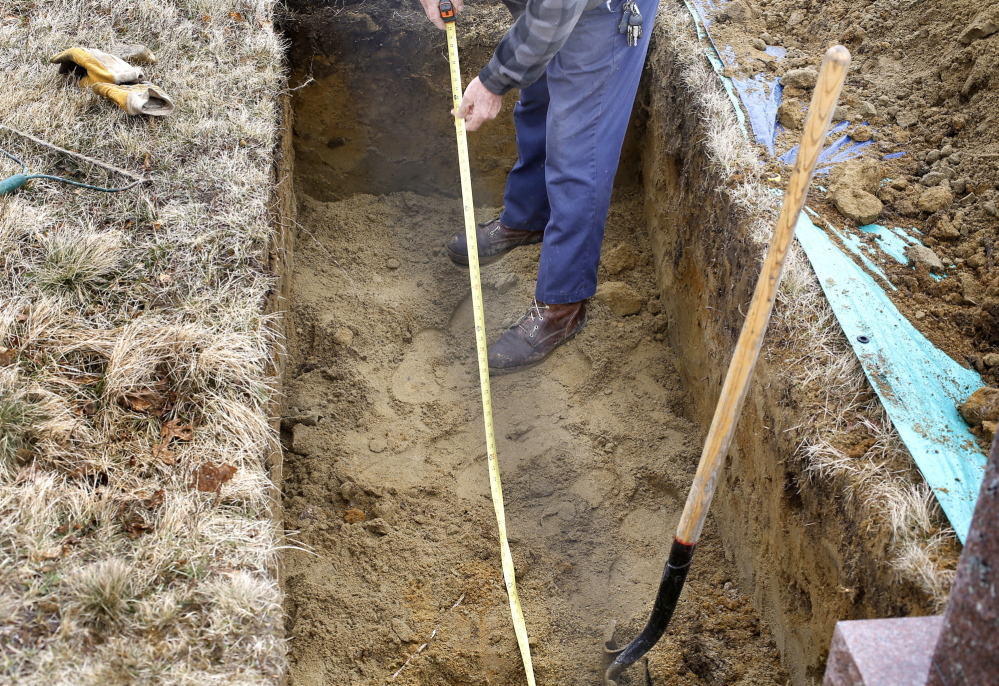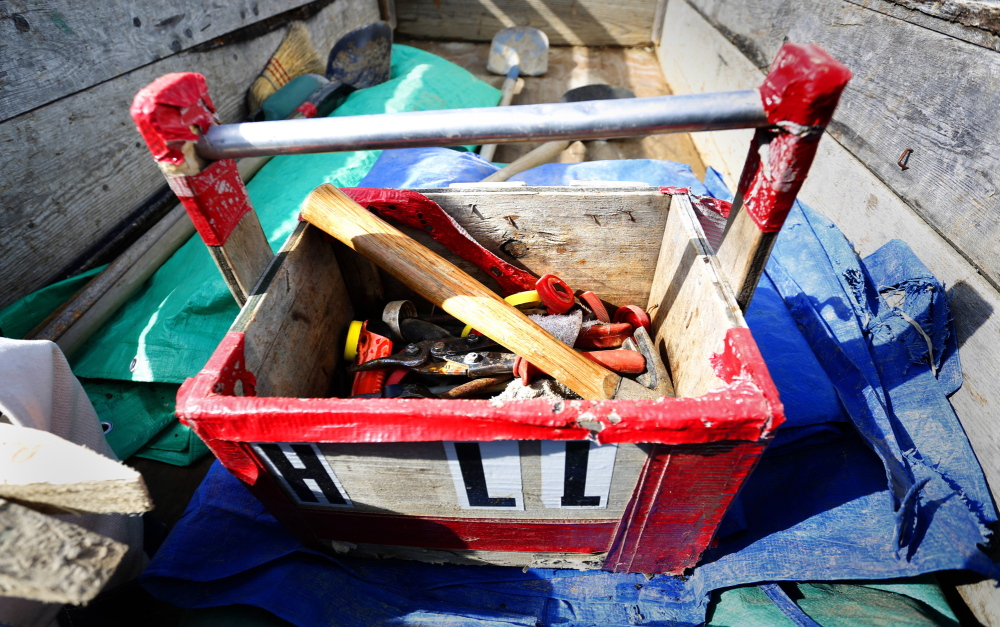When Everard Hall goes to work, he brings his memories with him.
On display on the large wooden rack in the back of his red pickup truck are a century-old steel pickax, a rusty saw he got from an old friend, and the first shovel he used to do the job he’s been doing – by hand – for almost 50 years.
“That shovel is old but still looks good, kinda like me,” he laughs.
On a chilly spring morning, Hall pulls into a parking space in front of the Milbridge House Restaurant in Milbridge. No one in this small coastal Washington County town even bats an eye. They’ve seen the antique tools and the sign that hangs proudly above his windshield many times before.
“The Gravedigger Hall,” it proclaims, in bright green letters – the words separated by two crosses.
“Everybody born on this earth has got a God-given talent,” Hall says. “I was lucky. I was born with two talents. I play harmonica, and I dig graves.”
Hall is a member of a fading profession. According to the Maine Cemetery Association, the vast majority of graves are now dug by backhoes.
“There are still a few holdouts digging by hand,” says association vice president Hugh LeMaster, “but nowadays it’s rare to see someone with a shovel.”
Hall found his calling when he was 22 years old, working in a stone shop in Milbridge, polishing tombstones.
“One day Mr. Warren, the undertaker in town, he came into the stone shop. He says, ‘Everard,’ he says, ‘the guy that digs graves for me is sick. I gotta get a grave dug, like to get it done tomorrow. Can you help me?’ I said, ‘Yeah, I never dug a grave before but I can dig it.’ ”
He was paid $50 for three days’ work.
He never looked back.
“I enjoy my work. You don’t enjoy your work, forget it.”
In the back corner of a small cemetery, on a ridge overlooking a blueberry barren, Hall is hard at work, ball cap pushed back on his head. There’s a light rain falling.
He’s standing waist-deep in a rectangle dug in the ground. He tosses shovelful after shovelful of sandy soil onto a blue tarp.
“It has to be 40 inches wide, has to be 8 foot, 6 inches long,” he says. “Ain’t 40 inches wide the vault won’t fit, ’cause the vault is 36. And you have to leave space to tamp dirt around the vault.”
Alongside the almost finished grave are precisely cut squares of sod that he’ll put back on top of the site after the burial.
Hall’s wife, Pat, says he works fast. And nobody pays more attention to detail.
“I’ve seen him start one (grave) and a few minutes later he’s halfway down under,” she says. “It’s amazing. And how he gets the corners, the sides so straight. It’s unbelievable.”
He figures he’s dug about 2,500 graves over the years. And he remembers just about every one.
He often takes pictures and carefully mounts them in scrapbooks.
“This is the grave for Bill Kelly,” he says, pointing to a faded photograph of a mound of flowers pasted onto a scrapbook page. “He was the postmaster when I was 10, 12 years old.”
He buried all six of his teachers, he says. And his mom, dad, his sister, Marilyn.
“It don’t bother me,” he says. “See, I’m a Christian person. It don’t bother me because I know that when your spirit has left the body there’s nothing left but skin and bones. Spirit’s gone from the body. Absent from the body, present with the Lord. Nothing left there.”
Digging graves is hard labor. But Hall is used to hard work. He left school in the eighth grade to rake blueberries and dig clams to help support his family. He’s one of 10 children – his mother lost two others in childbirth.
He knows he’s never going to get rich doing this job; he’s paid $475 per grave in summer, $675 in winter. In fact, sometimes it’s tough just to make ends meet, even with the little extra income he gets from cutting and selling wood.
“Sometimes I’ve gone three months, didn’t make a penny. Nothing. Light bill coming in, phone bills coming in, truck and car payments, grocery bill, and you don’t make nothing for three months. Not a cent.”
Winter is especially tough, when a lot of cemeteries are closed or unplowed. Hall says he can get through frozen ground with a jackhammer, but that doesn’t do him any good if he can’t get to the grave site.
Still, he can’t imagine doing anything else.
When he needs a break, he says, he’ll play his harmonica, filling the silence with song. He doesn’t stop for long. He likes to start early and get the job done.
It’s solitary work. But he says he’s never really alone.
“I’m out in the cemetery digging a grave. God is with me every day.”
And he doesn’t take the job home with him. Even on the saddest days.
“I buried a man and his wife and their baby all in one day,” Hall says. “All died in a car accident, bam, one night.”
“When you get home at night. … I have a daughter, I have grandchildren. And this is all behind me. I get the grave dug, this is all behind me. You can’t grieve for ’em. Job I gotta do. Do it, then go on.”
He gets a lot of business through referrals from funeral homes. But there are also plenty of people, like 99-year-old Doris Joy, who have already made Hall promise that he’ll dig their graves.
Joy lives right across the street from the Joyville Cemetery in South Addison, which is owned by her family. She can see her husband Raymond’s gravestone from the picture window in her living room.
Hall dug that grave 10 years ago. She liked his work.
“I’m old-fashioned,” Joy says. “I want something nice. I don’t want none of this modern stuff like cremation.”
“Now, when he gets through doing a grave, you never know there’s a grave there,” she says. “He fixes it all up and smooths it out. He takes care of it. Everard does a good job.”
Hall will be 70 years old in December. The arthritis in his hip gets to him once in a while, and he has a slight limp because of it. But otherwise, he says, he’s in good health. Strong enough to keep going.
“I ain’t gonna retire, no,” he says. “I’m gonna dig till I die.”
Send questions/comments to the editors.





Success. Please wait for the page to reload. If the page does not reload within 5 seconds, please refresh the page.
Enter your email and password to access comments.
Hi, to comment on stories you must . This profile is in addition to your subscription and website login.
Already have a commenting profile? .
Invalid username/password.
Please check your email to confirm and complete your registration.
Only subscribers are eligible to post comments. Please subscribe or login first for digital access. Here’s why.
Use the form below to reset your password. When you've submitted your account email, we will send an email with a reset code.